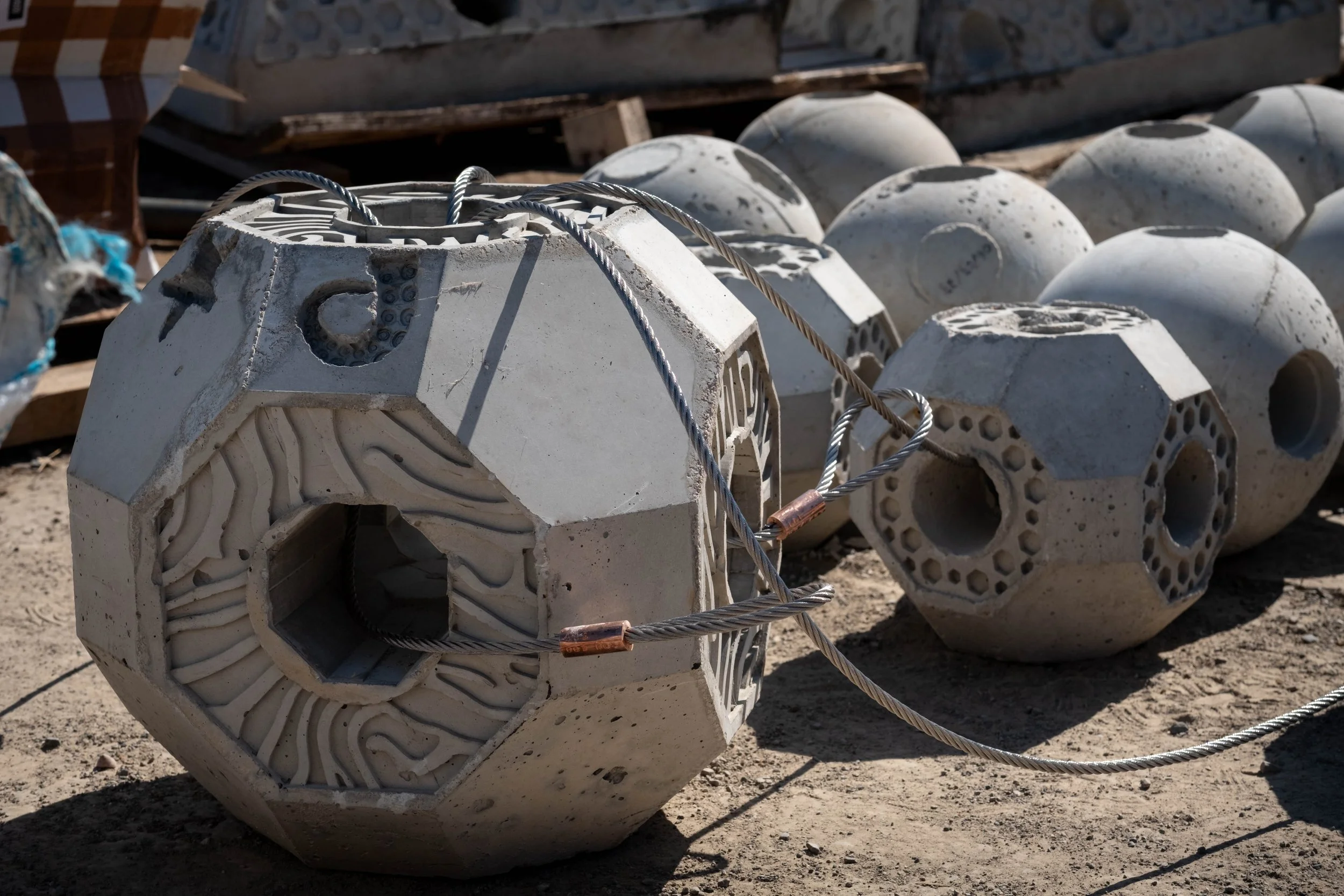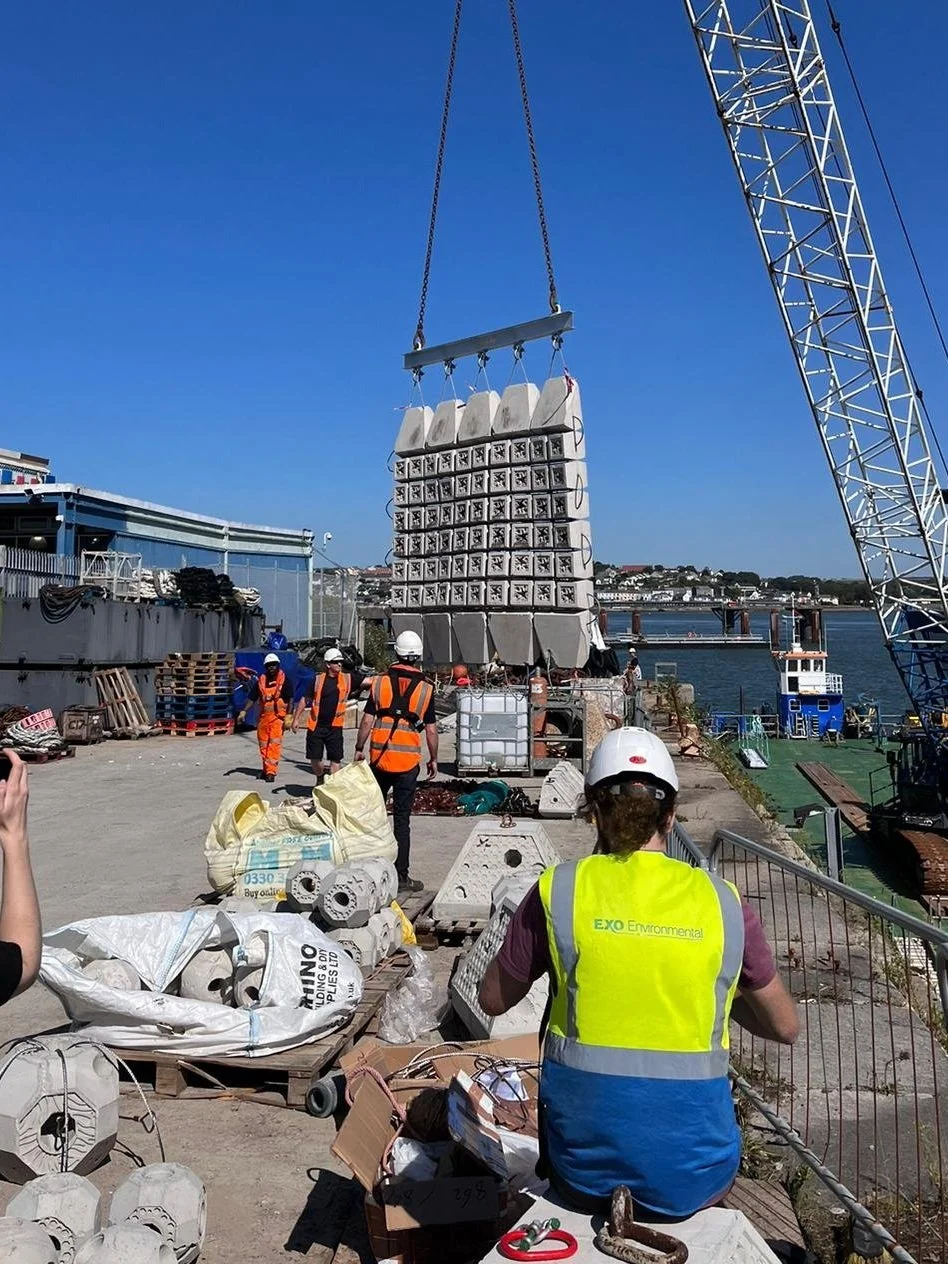Nature-Based subtidal solutions for floating offshore wind in the Celtic Sea
The Marine Energy Engineering Centre of Excellence (MEECE), led by the ORE Catapult has brought together Pembrokeshire-based Hiraeth Energy and Exo Engineering to trial the deployment of ‘ExoReefs’ at the Marine Energy Test Area (META) off the Pembrokeshire coast. This project aims to demonstrate the viability of using nature-Inclusive Design within crucial infrastructure within floating offshore windfarms in the Celtic Sea.
The UK has set ambitious targets to increase offshore wind capacity to 50GW by 2050. Historically, the UK’s offshore wind energy sector has primarily focused on fixed-bottom windfarms in the North Sea, but new data shows that the wind resources of the Celtic Sea could exceed 100GW if the potential of floating offshore wind farms is realised.
The development of offshore wind farms requires various infrastructure such as turbine foundations and cables. Scour protection is also needed to ensure these structures aren’t undermines and can continue to function as required. Unlike conventional offshore wind, floating wind farm infrastructure does not require scour protection at the base of the turbines, but protection for cable routes is still a necessity.
Exo Engineering are pioneering ‘ExoReefs’; scour protection with Nature-Inclusive Designs which seeks to achieve biodiversity gain. Conventional cable protection, such as granite rock armour or articulated concrete mattresses offer protection from scouring but typically neglect impacts on marine life. By incorporating complex features and unique microhabitats onto cable scour protection, a “reef effect” can be created which can support a range of native species and commercially important fish stocks. If floating offshore wind developments in the Celtic Sea use nature-friendly techniques, there could be many benefits for nature and the community.
Stephen Thompson, META Project Delivery Manager (Left), joins the Exo Engineering team alongside META Operations Manager Saul Young (Far right), Jonathan Payman (ORE Catapult) and Louise Rigby Williams (Hiraeth Energy).
Last week, multiple designs were successfully deployed off the Pembrokeshire coast at the Marine Energy Test Area (META), which will be monitored over an 18-month study period to examine the effectiveness of the products at encouraging biocolonisation. The results will be used to draw direct comparisons between differences in biocolonisation between the ExoReefs and conventional scour protection.
The deployment will allow Exo Engineering to see how our ExoReefs perform in a real-world marine environment, with the prototypes being deployed in East Pickard Bay. META offers technology developers access to pre-consented test sites which reduces the time, cost and risks associated with site development and consenting.
META Operations Manager, Saul Young said:
“We are delighted to host this experiment which will provide valuable real-world data to Exo-Engineering on their innovative scour protection which aims to benefit biodiversity. This project highlights META’s pre-consented test sites can be used for a wide variety of testing activities, not just energy convertors, but innovative components designed for the offshore renewables sector as well.”
Hiraeth Energy Project Partner, Joseph Kidd said:
“Safeguarding our ecosystems, and improving biodiversity and nature, are core to the Hiraeth Energy approach. We are delighted to be able to support the evaluation of Exo-Engineering’s innovative products that could improve the health and biodiversity of Wales’ coastal areas”.
This is an exciting new step to bringing innovative, floating wind technologies to the Celtic Sea. This project aligns with the ambitions of Hiraeth Energy (who has partnered with Magnora Offshore Wind to propose a 1GW floating wind development in the Celtic Sea) to support nature and habitat, as well as local communities, alongside the benefits of renewable energy generation.
If you would like to use Nature Inclusive Design within your project, we would love to hear from you! Get in touch to find out how we can help you to achieve your project goals



